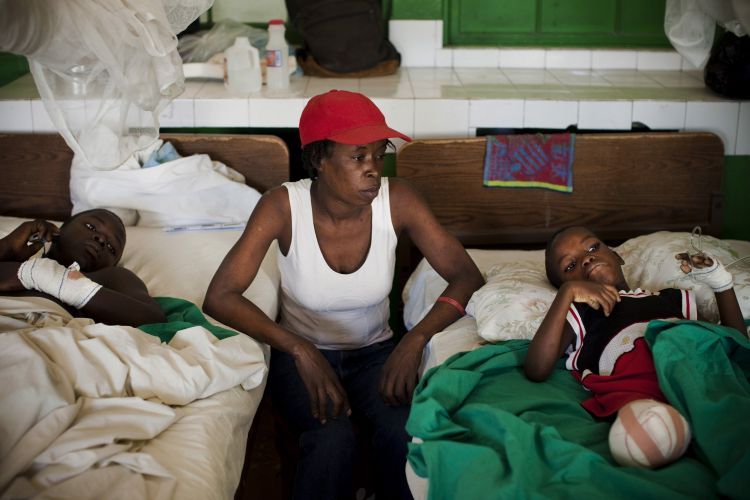Haiti earthquake crisis – 5 February 2010

One of the emerging trends in MSF's medical work in Haiti is the return to prominence of what could be described as some of the normal illnesses and conditions amongst people coming to the hospitals and clinics. The very considerable gaps in the country's healthcare provision before the earthquake meant that MSF's emergency facilities were always busy. The disruption of so much of the most basic medical care means that alongside the continuing dressing of injuries from the quake there is also a flow of every kind of patient.
In Port-au-Prince's Martissant hospital there are more and more children coming with illnesses like diarrhoea or respiratory tract infections. Out of Port-au-Prince, in the town of Leogane, the increasing reach of MSF's mobile clinics now touches 350 patients a day, many of them now for those more "normal" consultations.
In Chancerelle hospital, back in the capital, there has been a big increase in the number of maternity and obstetrics cases. The team there transformed a small stock room into an additional maternity room, increasing the number of beds from 18 to 40. An average of 12 children a day are being born there. Part of the explanation for the increase seems to be that more people in the city are becoming aware that this is a specialist centre that is very much working.
The earthquake related condition that continues to appear in MSF consultations is the psychological trauma that affects so many people who survived the disaster. In mobile clinics in Leogane and Port-au-Prince, around 20 percent of the patients looking for help are suffering from mental health problems. The classic symptoms are anxiety, despair, sleeping disruption, and even anger. Depending on the culture of the people involved, there may be more or less physical symptoms which derive from repression of these emotions. In Haiti, there is relatively little stigma associated with these feelings and so MSF's psychologists and psychiatrists there report that physical signs are limited to headaches and lack of appetite.
The earliest mental health work was with amputees and the more general provision of care for post operative cases is still very much a priority in Haiti because of an overall shortage of beds for this longer term care. MSF moved the first 20 patients from the St Louis inflatable hospital to the post operative "tent village" at nearby Delmas 30. While the Bicentenaire hospital now has 60 beds ready. A special treatment room for tetanus patients is also being created there to provide the intensive care necessary for this dangerous illness.
Living conditions for people who lost their homes and are now in camps under makeshift shelter are particularly difficult, with the need for water and sanitation being one of the pressing issues. The latest MSF contributions here are a plan to supply the 7,000 people living in the camps near the St Louis Hospital. While another team has identified between 20 and 30 sites in the city where they will be working to provide water trucking and latrines. In total, MSF is improving access to water and sanitation for around 40,000 displaced people in the Port-au-Prince and Léôgane areas. Distribution of household necessities, like blankets and jerrycans, has been done or is planned for around 7,000 families.





Leave a Comment